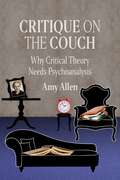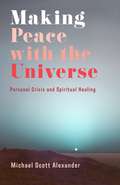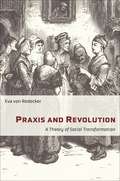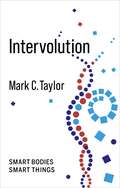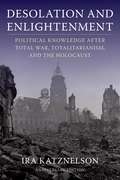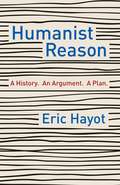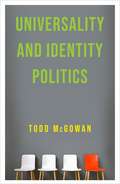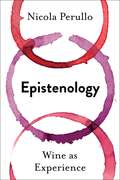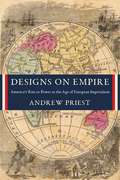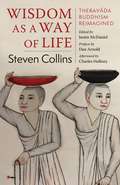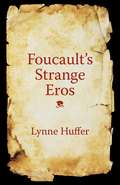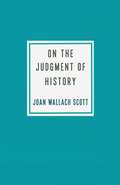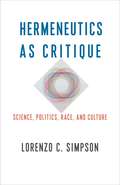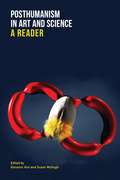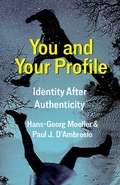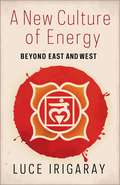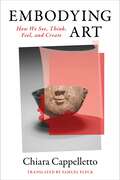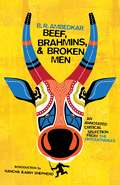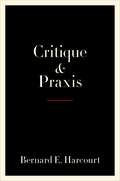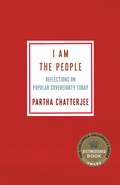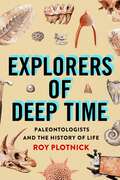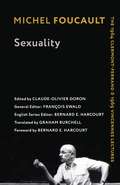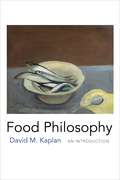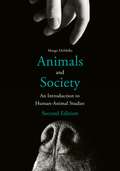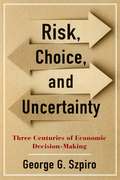- Table View
- List View
Critique on the Couch: Why Critical Theory Needs Psychoanalysis (New Directions in Critical Theory #73)
by Amy AllenDoes critical theory still need psychoanalysis? In Critique on the Couch, Amy Allen offers a cogent and convincing defense of its ongoing relevance.Countering the overly rationalist and progressivist interpretations of psychoanalysis put forward by contemporary critical theorists such as Jürgen Habermas and Axel Honneth, Allen argues that the work of Melanie Klein offers an underutilized resource. She draws on Freud, Klein, and Lacan to develop a more realistic strand of psychoanalytic thinking that centers on notions of loss, negativity, ambivalence, and mourning. Far from leading to despair, such an understanding of human subjectivity functions as a foundation of creativity, productive self-transformation, and progressive social change.At a time when critical theorists are increasingly returning to psychoanalytic thought to diagnose the dysfunctions of our politics, this book opens up new ways of understanding the political implications of psychoanalysis while preserving the progressive, emancipatory aims of critique.
Making Peace with the Universe: Personal Crisis and Spiritual Healing
by Michael Scott AlexanderThe world’s great religious and philosophical traditions often include poignant testimonies of spiritual turmoil and healing. Following episodes of harrowing personal crisis, including addictions, periods of anxiety and panic, and reminders of mortality, these accounts then also describe pathways to consolation and resolution.In Making Peace with the Universe, Michael Scott Alexander reads diverse classic religious accounts as masterpieces of therapeutic insight. In the company of William James, Socrates, Muslim legal scholar turned mystic Hamid al-Ghazali, Chinggis Khan as described by the Daoist monk Qui Chuji, and jazz musician and Catholic convert Mary Lou Williams, Alexander traces the steps from existential crisis to psychological health. He recasts spiritual confessions as case histories of therapy, showing how they remain radical and deeply meaningful even in an age of scientific psychology. They record the therapeutic affect of spiritual experience, testifying to the achievement of psychological well-being through the cultivation of an edifying spiritual mood.Mixing scholarly learning with episodes from his own skeptical quest, Alexander demonstrates how these accounts of private terror and personal triumph offer a model of therapy through spiritual adventure. An interdisciplinary consideration of the shared terrain of religion and psychology, Making Peace with the Universe offers an innovative view of what spiritual traditions can teach us about finding meaning in the modern world.
Praxis and Revolution: A Theory of Social Transformation (New Directions in Critical Theory #71)
by Eva von RedeckerThe concept of revolution marks the ultimate horizon of modern politics. It is instantiated by sites of both hope and horror. Within progressive thought, “revolution” often perpetuates entrenched philosophical problems: a teleological philosophy of history, economic reductionism, and normative paternalism. At a time of resurgent uprisings, how can revolution be reconceptualized to grasp the dynamics of social transformation and disentangle revolutionary practice from authoritarian usurpation?Eva von Redecker reconsiders critical theory’s understanding of radical change in order to offer a bold new account of how revolution occurs. She argues that revolutions are not singular events but extended processes: beginning from the interstices of society, they succeed by gradually rearticulating social structures toward a new paradigm. Developing a theoretical account of social transformation, Praxis and Revolution incorporates a wide range of insights, from the Frankfurt School to queer theory and intersectionality. Its revised materialism furnishes prefigurative politics with their social conditions and performative critique with its collective force.Von Redecker revisits the French Revolution to show how change arises from struggle in everyday social practice. She illustrates the argument through rich literary examples—a ménage à trois inside a prison, a radical knitting circle, a queer affinity group, and petitioners pleading with the executioner—that forge a feminist, open-ended model of revolution.Praxis and Revolution urges readers not only to understand revolutions differently but also to situate them elsewhere: in collective contexts that aim to storm manifold Bastilles—but from within.
Intervolution: Smart Bodies Smart Things (No Limits)
by Mark C. TaylorWhere does my body begin? Where does it end? What is inside my body? What is outside? What is primary? What is secondary? What is natural? What is artificial?Science fiction has long imagined a future fusion of humanity with technology. Today, many of us—especially people with health issues such as autoimmune diseases—have functionally become hybrids connected to other machines and to other bodies. The combination of artificial intelligence with implants, transplants, prostheses, and genetic reprogramming is transforming medical research and treatment, and it is now also transforming what we thought was human nature.Mark C. Taylor identifies this process as “intervolution” and explores how it is weaving together smart things and smart bodies to create new forms of life. Our wired bodies are no longer freestanding individuals, but interconnected nodes in worldwide networks. Recognizing this transformation overturns deeply entrenched distinctions and oppositions between minds and bodies. Intervolution reveals that we are already cyborgs, integral cogs in what will become a superorganism of bodies and things.
Desolation and Enlightenment: Political Knowledge After Total War, Totalitarianism, and the Holocaust (Leonard Hastings Schoff Lectures)
by Ira KatznelsonDuring and especially after World War II, a group of leading scholars who had been perilously close to the war’s devastation joined others fortunate enough to have been protected by distance in an effort to redefine and reinvigorate liberal ideals for a radically new age. Treating evil as an analytical category, they sought to discover the sources of twentieth-century horror and the potentialities of the modern state in the wake of desolation. In the process, they devised strikingly new ways to understand politics, sociology, and history that reverberate still.In this major intellectual history, Ira Katznelson examines the works of Hannah Arendt, Robert Dahl, Richard Hofstadter, Harold Lasswell, Charles Lindblom, Karl Polanyi, and David Truman, detailing their engagement with the larger project of reclaiming the West’s moral bearing. In light of their epoch’s calamities, these intellectuals insisted that the tradition of Enlightenment thought required a new realism, a good deal of renovation, and much recommitment. This array of historians, political philosophers, and social scientists understood that a simple reassertion of liberal modernism had been made radically insufficient by the enormities and moral catastrophes of war, totalitarianism, and the Holocaust. Confronting dashed hopes for reason and knowledge, they asked not just whether the Enlightenment should define modernity but also which Enlightenment we should wish to have.
Humanist Reason: A History. An Argument. A Plan
by Eric HayotAsk just about any humanist, and you will hear that the humanities are in a crisis. Facing utilitarian approaches to education, the corporatization of the university, plummeting enrollments, budget cuts, and political critiques from right, left, and center, humanists find themselves on the defensive. Eric Hayot argues that it is time to make a positive case for what the humanities are and what they can become.Hayot challenges scholars and students in the humanities to rethink and reconsider the work they do. Examining the origins of the humanist ethos in nineteenth-century Germany and tracing its philosophical roots back to Immanuel Kant, Hayot returns to the history of justifications for the humanities in order to build the groundwork for their future development. He develops the concept of “humanist reason” to understand the nature of humanist intellectual work and lays out a series of principles that undergird this core idea. Together, they constitute a provocative intellectual and practical program for a new way of thinking about the humanities, humanist thought, and their role in the university and beyond. Rather than appealing to familiar ethical or moral rationales for the importance of the humanities, Humanist Reason lays out a new vision that moves beyond traditional disciplines to demonstrate what the humanities can tell us about our world.
Universality and Identity Politics
by Todd McGowanThe great political ideas and movements of the modern world were founded on a promise of universal emancipation. But in recent decades, much of the Left has grown suspicious of such aspirations. Critics see the invocation of universality as a form of domination or a way of speaking for others, and have come to favor a politics of particularism—often derided as “identity politics.” Others, both centrists and conservatives, associate universalism with twentieth-century totalitarianism and hold that it is bound to lead to catastrophe.This book develops a new conception of universality that helps us rethink political thought and action. Todd McGowan argues that universals such as equality and freedom are not imposed on us. They emerge from our shared experience of their absence and our struggle to attain them. McGowan reconsiders the history of Nazism and Stalinism and reclaims the universalism of movements fighting racism, sexism, and homophobia. He demonstrates that the divide between Right and Left comes down to particularity versus universality. Despite the accusation of identity politics directed against leftists, every emancipatory political project is fundamentally a universal one—and the real proponents of identity politics are the right wing. Through a wide range of examples in contemporary politics, film, and history, Universality and Identity Politics offers an antidote to the impasses of identity and an inspiring vision of twenty-first-century collective struggle.
Epistenology: Wine as Experience (Arts and Traditions of the Table: Perspectives on Culinary History)
by Nicola PerulloWe think we know how to appreciate wine—trained connoisseurs take dainty sips in sterile rooms and provide ratings based on objective knowledge and technical expertise. In Epistenology, Nicola Perullo vigorously challenges this approach, arguing that it is the enjoyment of drinking wine as an active and participatory experience that matters.Perullo argues that wine comes to life not in the abstract space of the professional tasting but in the real world of shared experiences; wines can change in these encounters, and drinkers along with them. Just as a winemaker is not simply a producer but a nurturer, a wine is fully known only through an encounter among a group of drinkers in a specific place and time. Wine is not an object to analyze but an experience to make, creatively opening up new perceptual possibilities for settings, cuisines, and companions.The result of more than twenty years of research and practical engagement, Epistenology presents a new paradigm for the enjoyment of wine and through it a philosophy based on participatory and relational knowledge. This model suggests a profound shift—not knowledge about but with wine. Interweaving philosophical arguments with personal reflections and literary examples, this book is a journey with wine that shows how it makes life more creative and free.
Designs on Empire: America's Rise to Power in the Age of European Imperialism
by Andrew PriestIn the eyes of both contemporaries and historians, the United States became an empire in 1898. By taking possession of Cuba and the Philippines, the nation seemed to have reached a watershed moment in its rise to power—spurring arguments over whether it should be a colonial power at all. However, the questions that emerged in the wake of 1898 built on long-standing and far-reaching debates over America’s place in the world.Andrew Priest offers a new understanding of the roots of American empire that foregrounds the longer history of perceptions of European powers. He traces the development of American thinking about European imperialism in the years after the Civil War, before the United States embarked on its own overseas colonial projects. Designs on Empire examines responses to Napoleon III’s intervention in Mexico, Spain and the Ten Years’ War in Cuba, Britain’s occupation of Egypt, and the carving up of Africa at the Berlin Conference. Priest shows how observing and interacting with other empires shaped American understandings of the international environment and their own burgeoning power. He highlights ambivalence among American elites regarding empire as well as the prevalence of notions of racial hierarchy. While many deplored the way powerful nations dominated others, others saw imperial projects as the advance of civilization, and even critics often felt a closer affinity with European imperialists than colonized peoples.A wide-ranging book that blends intellectual, political, and diplomatic history, Designs on Empire sheds new light on the foundations of American power.
Wisdom as a Way of Life: Theravāda Buddhism Reimagined
by Steven CollinsThis wide-ranging and powerful book argues that Theravāda Buddhism provides ways of thinking about the self that can reinvigorate the humanities and offer broader insights into how to learn and how to act. Steven Collins argues that Buddhist philosophy should be approached in the spirit of its historical teachers and visionaries, who saw themselves not as preservers of an archaic body of rules but as part of a timeless effort to understand what it means to lead a worthy life. He contends that Buddhism should be studied philosophically, literarily, and ethically using its own vocabulary and rhetorical tools. Approached in this manner, Buddhist notions of the self help us rethink contemporary ideas of self-care and the promotion of human flourishing.Collins details the insights of Buddhist texts and practices that promote the ideal of active and engaged learning, offering an expansive and lyrical reflection on Theravāda approaches to meditation, asceticism, and physical training. He explores views of monastic life and contemplative practices as complementing and reinforcing textual learning, and argues that the Buddhist tenet that the study of philosophy and ethics involves both rigorous reading and an ascetic lifestyle has striking resonance with modern and postmodern ideas. A bold reappraisal of the history of Buddhist literature and practice, Wisdom as a Way of Life offers students and scholars across the disciplines a nuanced understanding of the significance of Buddhist ways of knowing for the world today.
Foucault's Strange Eros
by Lynne HufferWhat is the strange eros that haunts Foucault’s writing? In this deeply original consideration of Foucault’s erotic ethics, Lynne Huffer provocatively rewrites Foucault as a Sapphic poet. She uncovers eros as a mode of thought that erodes the interiority of the thinking subject. Focusing on the ethical implications of this mode of thought, Huffer shows how Foucault’s poetic archival method offers a way to counter the disciplining of speech.At the heart of this method is a conception of the archive as Sapphic: the past’s remains are, like Sappho’s verses, hole-ridden, scattered, and dissolved by time. Listening for eros across fragmented texts, Huffer stages a series of encounters within an archive of literary and theoretical readings: the eroticization of violence in works by Freud and Eve Kosofsky Sedgwick, the historicity of madness in the Foucault-Derrida debate, the afterlives of Foucault’s antiprison activism, and Monique Wittig’s Sapphic materialism. Through these encounters, Foucault’s Strange Eros conceives of ethics as experiments in living that work poetically to make the present strange. Crafting fragments that dissolve into Sapphic brackets, Huffer performs the ethics she describes in her own practice of experimental writing. Foucault’s Strange Eros hints at the self-hollowing speech of an eros that opens a space for the strange.
On the Judgment of History (Ruth Benedict Book Series)
by Joan Wallach ScottIn the face of conflict and despair, we often console ourselves by saying that history will be the judge. Today’s oppressors may escape being held responsible for their crimes, but the future will condemn them. Those who stand up for progressive values are on the right side of history. As ideas once condemned to the dustbin of history—white supremacy, hypernationalism, even fascism—return to the world, threatening democratic institutions and values, can we still hold out hope that history will render its verdict?Joan Wallach Scott critically examines the belief that history will redeem us, revealing the implicit politics of appeals to the judgment of history. She argues that the notion of a linear, ever-improving direction of history hides the persistence of power structures and hinders the pursuit of alternative futures. This vision of necessary progress perpetuates the assumption that the nation-state is the culmination of history and the ultimate source for rectifying injustice. Scott considers the Nuremberg Tribunal and South Africa’s Truth and Reconciliation Commission, which claimed to carry out history’s judgment on Nazism and apartheid, and contrasts them with the movement for reparations for slavery in the United States. Advocates for reparations call into question a national history that has long ignored enslavement and its racist legacies. Only by this kind of critical questioning of the place of the nation-state as the final source of history’s judgment, this book shows, can we open up room for radically different conceptions of justice.
Hermeneutics as Critique: Science, Politics, Race, and Culture (New Directions in Critical Theory #72)
by Lorenzo C. SimpsonHermeneutics has frequently been dismissed as useful only for literary and textual analysis. Some consider it to be Eurocentric or inherently relativistic and thus unsuited to social critique. Lorenzo C. Simpson offers a persuasive and powerful argument that hermeneutics is a valuable tool not only for critical theory but also for robustly addressing many of the urgent issues of today.Simpson demonstrates that hermeneutics exhibits significant interpretive advantages compared to competing explanatory modalities. While it shares with pragmatism a suspicion of essentialism, an understanding that disagreements are situated, and an insistence on the dialogical nature of understanding, it nevertheless resolutely rejects the relativistic accounts of rationality that are often associated with pragmatism. In the tradition of Gadamer, Simpson firmly establishes hermeneutics as a resource for both philosophy and the social sciences. He shows its utility for unpacking intractable issues in the philosophy of science, multiculturalism, social epistemology, and racial and social justice in the global arena. Simpson addresses fraught questions such as why recent claims that “race” has a biological basis lack grounding, whether female genital excision can be critically addressed without invidious ethnocentrism, and how to lay the foundations for meaningful cross-cultural dialogue and reparative justice. This book reveals how hermeneutics can be a worthy partner with critical theory in achieving emancipatory aims.
Posthumanism in Art and Science: A Reader
by Aloi, Giovanni; McHugh, SusanPosthumanism synthesizes philosophical, literary, and artistic responses to technological advancements, globalization, and mass extinction in the Anthropocene. It asks what it can mean to be human in an increasingly more-than-human world that has lost faith in the ideal of humanism, the autonomous, rational subject, and it models generative alternatives cognizant of the demands of social and ecological justice. Amid rising social justice movements, collapsing economic structures, and the dwindling power of cultural institutions, posthumanism advances thinking on new and previously unenvisionable challenges.Posthumanism in Art and Science is an anthology of indispensable statements and artworks that provide an unprecedented mapping of this intellectual and aesthetic development in a global context. It features groundbreaking theorists including Donna Haraway, Rosi Braidotti, Mel Y. Chen, Michael Marder, Alexander Weheliye, Anna Tsing, Timothy Morton, N. Katherine Hayles, Bruno Latour, Francesca Ferrando, and Cary Wolfe, as well as innovative, influential artists and curators such as Yvonne Rainer, Skawennati, Chus Martínez, William Wegman, Nandipha Mntambo, Cassils, Pauline Oliveros, and Doo-sung Yoo. These provocative and compelling works, including previously unpublished interviews and essays, speak to the ongoing conceptual and political challenge of posthumanist thinking in a time of unprecedented cultural and environmental crises.An essential primer and reference for educators, students, artists, and art enthusiasts, this volume offers a powerful framework for rethinking anthropocentric certitudes and reenvisioning equitable and sustainable futures.
You and Your Profile: Identity After Authenticity
by Hans-Georg Moeller Paul J. D'AmbrosioMore and more, we present ourselves and encounter others through profiles. A profile shows us not as we are seen directly but how we are perceived by a broader public. As we observe how others observe us, we calibrate our self-presentation accordingly. Profile-based identity is evident everywhere from pop culture to politics, marketing to morality. But all too often critics simply denounce this alleged superficiality in defense of some supposedly pure ideal of authentic or sincere expression.This book argues that the profile marks an epochal shift in our concept of identity and demonstrates why that matters. You and Your Profile blends social theory, philosophy, and cultural critique to unfold an exploration of the way we have come to experience the world. Instead of polemicizing against the profile, Hans-Georg Moeller and Paul J. D’Ambrosio outline how it works, how we readily apply it in our daily lives, and how it shapes our values—personally, economically, and ethically. They develop a practical vocabulary of life in the digital age. Informed by the Daoist tradition, they suggest strategies for handling the pressure of social media by distancing oneself from one’s public face. A deft and wide-ranging consideration of our era’s identity crisis, this book provides vital clues on how to stay sane in a time of proliferating profiles.
A New Culture of Energy: Beyond East and West
by Luce IrigarayIn A New Culture of Energy, Luce Irigaray reflects on three critical concerns of our time: the cultivation of energy in its many forms, the integration of Asian and Western traditions, and the reenvisioning of religious figures for the contemporary world. A philosopher as well as a psychoanalyst, Irigaray draws deeply on her personal experience in addressing these questions. In her view, although psychoanalysis can succeed in releasing mental energy, it fails to support physical and spiritual well-being. In pursuit of an alternative, she took up the bodily practices of yoga and pranayama breathing, which she considers in light of her analysis of sexuate belonging and difference. Reflecting on these practices, Irigaray contrasts yoga’s approach to the natural world with how the Western tradition privileges mastery over nature. These varied sources provoke her to question how a tradition imagines transcendence and the divine. In the book’s final section, she reinterprets the figure of Mary through breath, self-affection, and touch, recalibrating her physicality within a natural world. A reflection on the liberation of human energy, this book urges us to cultivate an evolutionary culture in harmony with all living beings.
Embodying Art: How We See, Think, Feel, and Create
by Chiara CappellettoIn recent years, neuroscientists have made ambitious attempts to explain artistic processes and spectatorship through brain imaging techniques. But can brain science really unravel the workings of art? Is the brain in fact the site of aesthetic appreciation?Embodying Art recasts the relationship between neuroscience and aesthetics and calls for shifting the focus of inquiry from the brain itself to personal experience in the world. Chiara Cappelletto presents close readings of neuroscientific and philosophical scholarship as well as artworks and art criticism, identifying their epistemological premises and theoretical consequences. She critiques neuroaesthetic reductionism and its assumptions about a mind/body divide, arguing that the brain is embodied and embedded in affective, cultural, and historical milieus.Cappelletto considers understandings of the human brain encompassing scientific, philosophical, and visual and performance arts discourses. She examines how neuroaesthetics has constructed its field of study, exploring the ways digital renderings and scientific data have been used to produce the brain as a cultural and visual object. Tracing the intertwined histories of brain science and aesthetic theory, Embodying Art offers a strikingly original and profound philosophical account of the human brain as a living artifact.
Beef, Brahmins, and Broken Men: An Annotated Critical Selection from The Untouchables
by B. R. AmbedkarOne of twentieth-century India’s great polymaths, statesmen, and militant philosophers of equality, B. R. Ambedkar spent his life battling Untouchability and instigating the end of the caste system. In his 1948 book The Untouchables, he sought to trace the origin of the Dalit caste. Beef, Brahmins, and Broken Men is an annotated selection from this work, just as relevant now, when the oppression of and discrimination against Dalits remains pervasive.Ambedkar offers a deductive, and at times a speculative, history to propose a genealogy of Untouchability. He contends that modern-day Dalits are descendants of those Buddhists who were fenced out of caste society and rendered Untouchable by a resurgent Brahminism since the fourth century BCE. The Brahmins, whose Vedic cult originally involved the sacrifice of cows, adapted Buddhist ahimsa and vegetarianism to stigmatize outcaste Buddhists who were consumers of beef. The outcastes were soon relegated to the lowliest of occupations and prohibited from participation in civic life. To unearth this lost history, Ambedkar undertakes a forensic examination of a wide range of Brahminic literature. Heavily annotated with an emphasis on putting Ambedkar and recent scholarship into conversation, Beef, Brahmins, and Broken Men assumes urgency as India witnesses unprecedented violence against Dalits and Muslims in the name of cow protection.
Critique and Praxis
by Bernard E. HarcourtCritical philosophy has always challenged the division between theory and practice. At its best, it aims to turn contemplation into emancipation, seeking to transform society in pursuit of equality, autonomy, and human flourishing. Yet today’s critical theory often seems to engage only in critique. These times of crisis demand more.Bernard E. Harcourt challenges us to move beyond decades of philosophical detours and to harness critical thought to the need for action. In a time of increasing awareness of economic and social inequality, Harcourt calls on us to make society more equal and just. Only critical theory can guide us toward a more self-reflexive pursuit of justice. Charting a vision for political action and social transformation, Harcourt argues that instead of posing the question, “What is to be done?” we must now turn it back onto ourselves and ask, and answer, “What more am I to do?”Critique and Praxis advocates for a new path forward that constantly challenges each and every one of us to ask what more we can do to realize a society based on equality and justice. Joining his decades of activism, social-justice litigation, and political engagement with his years of critical theory and philosophical work, Harcourt has written a magnum opus.
I Am the People: Reflections on Popular Sovereignty Today (Ruth Benedict Book Series)
by Partha ChatterjeeThe forms of liberal government that emerged after World War II are in the midst of a profound crisis. In I Am the People, Partha Chatterjee reconsiders the concept of popular sovereignty in order to explain today’s dramatic outburst of movements claiming to speak for “the people.”To uncover the roots of populism, Chatterjee traces the twentieth-century trajectory of the welfare state and neoliberal reforms. Mobilizing ideals of popular sovereignty and the emotional appeal of nationalism, anticolonial movements ushered in a world of nation-states while liberal democracies in Europe guaranteed social rights to their citizens. But as neoliberal techniques shrank the scope of government, politics gave way to technical administration by experts. Once the state could no longer claim an emotional bond with the people, the ruling bloc lost the consent of the governed. To fill the void, a proliferation of populist leaders have mobilized disaffected groups into a battle that they define as the authentic people against entrenched oligarchy.Once politics enters a spiral of competitive populism, Chatterjee cautions, there is no easy return to pristine liberalism. Only a counter-hegemonic social force that challenges global capital and facilitates the equal participation of all peoples in democratic governance can achieve significant transformation. Drawing on thinkers such as Antonio Gramsci, Michel Foucault, and Ernesto Laclau and with a particular focus on the history of populism in India, I Am the People is a sweeping, theoretically rich account of the origins of today’s tempests.
Explorers of Deep Time: Paleontologists and the History of Life
by Roy PlotnickPaleontology is one of the most visible yet most misunderstood fields of science. Children dream of becoming paleontologists when they grow up. Museum visitors flock to exhibits on dinosaurs and other prehistoric animals. The media reports on fossil discoveries and new clues to mass extinctions. Nonetheless, misconceptions abound: paleontologists are assumed only to be interested in dinosaurs, and they are all too often imagined as bearded white men in battered cowboy hats.Roy Plotnick provides a behind-the-scenes look at paleontology as it exists today in all its complexity. He explores the field’s aims, methods, and possibilities, with an emphasis on the compelling personal stories of the scientists who have made it a career. Paleontologists study the entire history of life on Earth; they do not only use hammers and chisels to unearth fossils but are just as likely to work with cutting-edge computing technology. Plotnick presents the big questions about life’s history that drive paleontological research and shows why knowledge of Earth’s past is essential to understanding present-day environmental crises. He introduces readers to the diverse group of people of all genders, races, and international backgrounds who make up the twenty-first-century paleontology community, foregrounding their perspectives and firsthand narratives. He also frankly discusses the many challenges that face the profession, with key takeaways for aspiring scientists. Candid and comprehensive, Explorers of Deep Time is essential reading for anyone curious about the everyday work of real-life paleontologists.
Sexuality: The 1964 Clermont-Ferrand and 1969 Vincennes Lectures (Foucault's Early Lectures and Manuscripts)
by Michel FoucaultMichel Foucault’s The History of Sexuality—the first volume of which was published in 1976—exerts a vast influence across the humanities and social sciences. However, Foucault’s interest in the history of sexuality began as early as the 1960s, when he taught two courses on the subject. These lectures offer crucial insight into the development of Foucault’s thought yet have remained unpublished until recently.This book presents Foucault’s lectures on sexuality for the first time in English. In the first series, held at the University of Clermont-Ferrand in 1964, Foucault asks how sexuality comes to be constituted as a scientific body of knowledge within Western culture and why it derived from the analysis of “perversions”—morbidity, homosexuality, fetishism. The subsequent course, held at the experimental university at Vincennes in 1969, shows how Foucault’s theories were reoriented by the events of May 1968; he refocuses on the regulatory nature of the discourse of sexuality and how it serves economic, social, and political ends. Examining creators of political and literary utopias in the nineteenth and twentieth centuries, from Sade to Fourier to Marcuse, who attempted to integrate “natural” sexualities, including transgressive forms, into social and economic life, Foucault elaborates a double critique of the naturalization and the liberation of sexuality. Together, the lectures span a range of interests, from abnormality to heterotopias to ideology, and they offer an unprecedented glimpse into the evolution of Foucault’s transformative thinking on sexuality.
Food Philosophy: An Introduction (California Studies In Food And Culture Ser. #39)
by David M. KaplanFood is a challenging subject. There is little consensus about how and what we should produce and consume. It is not even clear what food is or whether people have similar experiences of it. On one hand, food is recognized as a basic need, if not a basic right. On the other hand, it is hard to generalize about it given the wide range of practices and cuisines, and the even wider range of tastes.This book is an introduction to the philosophical dimensions of food. David M. Kaplan examines the nature and meaning of food, how we experience it, the social role it plays, its moral and political dimensions, and how we judge it to be delicious or awful. He shows how the different branches of philosophy contribute to a broader understanding of food: what food is (metaphysics), how we experience food (epistemology), what taste in food is (aesthetics), how we should make and eat food (ethics), how governments should regulate food (political philosophy), and why food matters to us (existentialism). Kaplan embarks on a series of philosophical investigations, considering topics such as culinary identity and authenticity, tasting and food criticism, appetite and disgust, meat eating and techno-foods, and consumerism and conformity. He emphasizes how different narratives help us navigate the complex world of food and reminds us we all have responsibilities to ourselves, to others, and to animals. An original treatment of a timely subject, Food Philosophy is suitable for undergraduates while making a significant contribution to scholarly debates.
Animals and Society: An Introduction to Human-Animal Studies
by Margo DeMelloHuman-animal studies is an interdisciplinary field that explores the spaces that animals occupy in human social and cultural worlds. It examines the interactions humans and animals have with each other and the ways animal lives intersect with human societies. Since existing social orders rely on the exploitation of animals to serve human needs, the questions posed by human-animal studies touch upon a wide range of fundamental issues.Animals and Society provides a broad overview of this rapidly growing field. Margo DeMello offers students and scholars a holistic and comprehensive picture of the state of inquiry into the relationships that exist between humans and other animals. She considers interactions between animals and humans in social organizations, such as the family, the legal system, and political and religious institutions. A major focus is the social construction of animals in world cultures and the way in which these social meanings are used to reinforce and perpetuate hierarchical human relationships such as racism, sexism, and class privilege. The book also examines how different human groups construct a range of identities for themselves and for others through animals.This second edition of Animals and Society is fully updated and expanded throughout, enhancing the book’s relevance for student and activist readers alike. It includes many new international examples, all-new case studies, and updated supplementary readings.
Risk, Choice, and Uncertainty: Three Centuries of Economic Decision-Making
by George G. SzpiroAt its core, economics is about making decisions. In the history of economic thought, great intellectual prowess has been exerted toward devising exquisite theories of optimal decision making in situations of constraint, risk, and scarcity. Yet not all of our choices are purely logical, and so there is a longstanding tension between those emphasizing the rational and irrational sides of human behavior. One strand develops formal models of rational utility maximizing while the other draws on what behavioral science has shown about our tendency to act irrationally.In Risk, Choice, and Uncertainty, George G. Szpiro offers a new narrative of the three-century history of the study of decision making, tracing how crucial ideas have evolved and telling the stories of the thinkers who shaped the field. Szpiro examines economics from the early days of theories spun from anecdotal evidence to the rise of a discipline built around elegant mathematics through the past half century’s interest in describing how people actually behave. Considering the work of Locke, Bentham, Jevons, Walras, Friedman, Tversky and Kahneman, Thaler, and a range of other thinkers, he sheds light on the vast scope of discovery since Bernoulli first proposed a solution to the St. Petersburg Paradox. Presenting fundamental mathematical theories in easy-to-understand language, Risk, Choice, and Uncertainty is a revelatory history for readers seeking to grasp the grand sweep of economic thought.
